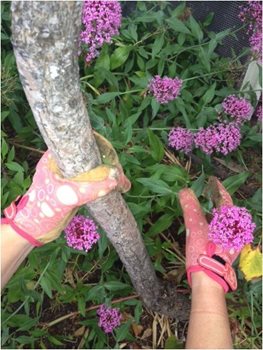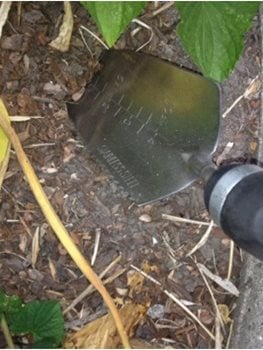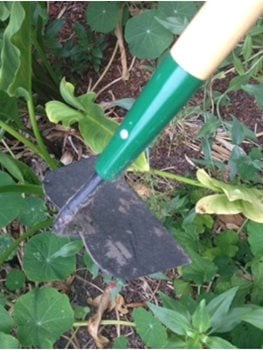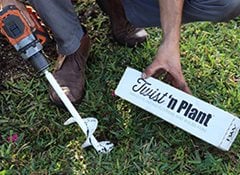All In One Gardening Tool
It's easy to go overboard when purchasing landscaping tools. They can take up a lot space and cost a lot of money, but staying focused on the basics can keep your shed or storage area from becoming overcrowded. There's always bigger and better, but buying the best quality tools that your budget will allow, and maintaining them, can go a long way in getting the most out of your investment.
Here are 12 essential garden tools to get you going on any garden project you have in mind:
-

Gloves.
1. Gloves
While gardening can be a wonderful hobby, it can quickly turn into a thorny and splintery hassle without the right pair of gloves.
- Gloves should be durable but not too bulky, especially for working with seeds or transplanting seedlings.
- Fit is important, as poorly fitting gloves can cause blisters or result in accidents from slipping off.
- Fabrics that are water resistant, but also breathable, will help keep hands cool and comfortable.
- Longer cuffs protect wrists and forearms from scratches and keep soil from getting in.
- Store gloves out of sunlight, away from water and safe from insects.
Botanical photographer, Ellen Hoverkamp recommends Foxgloves. They are made of high-tech sport fabric that is water resistant, breathable, and provide a form fit that has been described as a 'second skin'. Buy Foxgloves on Amazon.
-
2. Pruning Shears
Hand pruners, also called secateurs, help reign in plants that are getting out of control and taking over. Anvil-style pruners cut with a sharp blade meeting a flat surface, similar to a knife on a board. Bypass pruners cut with a sharp blade passing by a sharp-edged flat surface, more like scissors.
- Anvil pruners are best for dead wood and can cause crush injuries to fresh, green stems and branches.
- Bypass pruners are better for live plants and green wood.
- Pruners should fit easily in the palm of your hand.
- Ratcheting pruners provide increased cutting strength, perfect for anyone with reduced hand strength or arthritis.
- For cleaner cuts and less injury to plants, pruners should be sharpened regularly. (See Garden Tool Care & Maintenance for more)
For an anvil-style pruning tool, Hovercamp recommends ratcheting pruners. The increased strength from the ratcheting action makes cutting through thicker or harder branches easier. Buy ratcheting anvil pruners on Amazon.
-
3. Loppers
Another cutting tool, loppers are basically long-handled pruners used to trim hard to reach areas and cut thicker branches. The long handles provide the leverage it takes to cut through branches up to an inch or more in diameter. There are anvil and bypass types, just like pruners. Handles generally range from 16 to 36 inches.
- Bypass loppers are more precise in cut location than anvil style.
- Longer handled loppers can be heavy. Know what you'll be cutting and how far you'll need to reach and get the appropriate length.
- Lightweight aluminum or carbon-composite handles can be lighter.
- Like pruners, keep lopper blades in good condition and sharpen regularly.
For anvil-style loppers, our editors recommend the Tabor Tools GG12 Anvil Lopper. It can cut branches up to 2 inches in diameter and is perfect for dry or woody growth. The carbon steel blade stays sharp, making cutting easy. Buy the Tabor GG12 Anvil Loppers on Amazon.
-
4. Garden Fork
An efficient tool for turning soil, garden forks can dig into dense soil better than a spade.
- Forks with a slight curve to the spines are useful for scooping mulch or turning compost piles, much like a pitchfork.
- Straight tines are better for digging; great for compacted, rocky, or clay soil.
- Square tines are stronger than flat tines which can bend when they hit a rock or root.
Landscape designer Genevieve Schmidt recommends the Radius Garden 203 Pro Ergonomic Steel Digging Fork. The stainless steel, square tines resist rusting and the ergonomic handle has a non-slip grip. Buy the Pro Stainless Digging Fork on Amazon.
-

Hand trowel.
5. Hand Trowel
The essential hand tool, trowels are wonderful for transplanting bedding plants and herbs, planting containers, and taking out weeds.
- Select a broad blade to move more soil or a long, narrow blade to dig up weeds or for rocky soil.
- The handle should fit comfortably in your hand.
- Trowels forged from stainless steel, or at least with a stainless steel head, are more durable and will last longer.
Schmidt also recommends the Garrett Wade Tulip Trowel. Its sharp blades cut through stubborn roots with ease, making it ideal for planting bulbs or planting around trees. Buy the Tulip Trowel on Amazon.
-
6. Spade
These short-handled square shovels are garden workhorses. They make easy work of digging holes for plants, edging, lifting sod, and moving small mounds of dirt from one area to another. This tool can be more on the pricey side, but a good spade will last you the rest of your gardening life.
- Treads on top of the blade give a sturdier and more comfortable foot surface when needing an extra push.
- Ash hardwood handles are durable and absorb shock and vibration.
- Generally available with long or short handles. Longer handles provide more leverage, but are heavier.
- Stainless steel heads are strong and won't rust.
Executive director of the Coastal Maine Botanical Gardens William Cullina recommends the King of Spades Model 38 Balling Spade. It has a virtually unbreakable handle made from alloy tubing and a heat-treated blade with a sharp edge. Buy the King of Spades balling spade on Amazon.
-
7. Rake
When leaves and debris fall, your sturdy rake is there to whisk them away. Rakes come in a wide variety of styles and sizes, but a great starter is a standard leaf rake.
- Adjustable rakes do the job of more than one tool, reaching into narrow areas or gathering large piles of leaves.
- Steel tines are stronger and may be rougher on delicate lawns than plastic tines.
Our editors recommend the Gardenrite Adjustable Garden Leaf Rake. The rake head expands from 7 to 22 inches, and when stored in the collapsed position, it takes up less room. Buy the Gardenrite Adjustable Rake on Amazon.
-

Hoe.
8. Hoe
Your type of garden will dictate what type of hoe is best for you. A veggie garden may require a sturdy, wide hoe. If you have perennial gardens, a more delicate touch and a thinner hoe may be required. Hoes are useful in preparing garden and flower beds and cutting down weeds.
- Look for a comfortable handle with a long reach.
- A sharp blade works better and is easier to use.
- Weeding hoes, also called hula or stirrup hoes, have an open square head and are pushed back and forth just under the soil surface to cut down top growth.
- Flat hoes are good for turning the soil in rows in vegetable gardens.
Our editors recommend the Rogue Garden Hoe 575G. It has a high-grade tempered steel head that holds its sharp edge well. It is sharpened on 3 sides so it can be used at all angles. Buy the Rogue Garden Hoe 575G on Amazon.
-
9. Garden Hose with Adjustable Nozzle
Water is the foundation of your garden's life and it's important that your garden hose can reach and spray every area. There are three basic hose diameters: ½-inch (avg 9 gal per minute), 5/8-inch (avg 15 gal per minute), and ¾-inch (up to 25 gal per minute). An adjustable nozzle puts you in control of the water pressure and spray radius.
- Estimate the amount of length you will need with your hose before buying one.
- Hose length will affect water pressure - the longer the hose, the lower the resulting pressure.
- Vinyl hoses are lighter weight and less expensive, but kink easier and don't last as long as rubber construction.
- Store hoses coiled up and out of direct sunlight. Storing with kinks in them can result in weak spots.
Schmidt also recommends the Tuff-Guard Hose and Bon Aire Ultimate Hose Nozzle. The Tuff-Guard hose is flexible, strong, and resists kinking. She suggests that it be stored on a hose hanger or manual hose reel. The Bon Aire Ultimate Hose Nozzle is light weight and has a shut-off at either end of the spray range. The fire-hose-style nozzle goes from a light flow to a drenching shower, and can be used for cleaning concrete when adjusted to a nearly solid stream. Buy the Tuff Guard Hose and Bon Aire Ultimate Hose Nozzle on Amazon.
-
10. Watering Wand
Give your plants a gentle rain shower with a water-breaking wand. The extended reach is also helpful to get to out-of-the-way containers, hanging plants, or the back edges of borders. Watering wands come in a variety of lengths, from 10 to 48 inches.
- Choose an appropriate length for your needs - longer for high hanging baskets, shorter for tighter spaces.
- Built-in shut off valves in the handle conserve water and allow you to adjust the flow.
Kitchen gardener and cookbook author Jeanne Kelley recommends the Dramm One-Touch Rain Wand. The angled arm allows you to reach under foliage of delicate plants and also reach into hanging baskets. The valve slides easily with just the thumb. Buy the Dramm One-Touch Rain Wand on Amazon.
-
11. Watering Can
There are 2 basic types of watering cans, plastic or metal. There are hundreds of styles, colors, sizes and nozzle options.
- Plastic cans can be lighter than metal, but won't last as long.
- Metal cans should be galvanized to resist rusting.
- Consider the size of the can relative to your strength, a gallon of water weighs just over 8 pounds.
- The handle position should allow you to carry a full can and also tip it to pour easily.
- Two-handled designs allow for better stability for children or elderly gardeners.
- You may need two: a larger one with a sprinkler head for outdoors, and a smaller, long-necked version for houseplants.
For outdoor use, our editors recommend the Bloem Deluxe Watering Can with a dual-handle design and removable sprinkle nozzle. It's BPA free and has a 2.5-gallon capacity. Buy the Bloem Deluxe Watering Can on Amazon.
-
12. Wheelbarrow
If your backyard has extra soil to be moved around, compost or mulch that needs to be added to garden beds, or any other heavy lifting and moving project, a wheelbarrow can help you haul hundreds of pounds!
- Traditional dual-handle, single wheel styles can be harder to balance heavy or unevenly distributed loads.
- Single-handle two-wheel models are easier to balance, better for those with limited strength or when pulling over uneven terrain.
- Single-handled wheelbarrows can be pushed or pulled with one hand.
- Store it clean and dry to prevent rust.
- Keep the wheels inflated properly for easier wheeling.
Our editors recommend the Marathon Dual-Wheel Yard Rover. At just 29 pounds overall, it weighs 25% less than a traditional wheelbarrow, and the single handle makes it easy to push, pull and dump. Buy the Marathon Dual-Wheel Yard Rover on Amazon.

Twist 'N Plant garden auger. Photo: Proven Winners.
GARDEN AUGERS MAKE PLANTING FUN!
"I'm impressed! That saved a lot of time!" Award-winning landscape architect Jack Barnwell highly recommends the new Twist 'n Plant gardening augers from Proven Winners. These new tools help get your plants in the ground in no time—and even enjoy the digging!
Available in 3 sizes: REGULAR (3" x 12"), JUMBO (5" x 15"), and EXTENDED (3" x 24"). Plant everything from 4-inch to 1-gallon plants in holes up to 24 inches deep. They can also be used to till soil or mix fertilizer. Get more info and watch a video to see it in action.
By investing in these essential gardening tools, your shed will house everything it needs to keep your garden beautiful and growing.
RELATED:
10 Gardening Tools the Experts Are Using
How to Care for Garden Tools
When you purchase products through links on our site, we may receive an affiliate commission. Thank you for your support.
All In One Gardening Tool
Source: https://www.gardendesign.com/how-to/tools.html
Posted by: simsthicalin.blogspot.com

0 Response to "All In One Gardening Tool"
Post a Comment